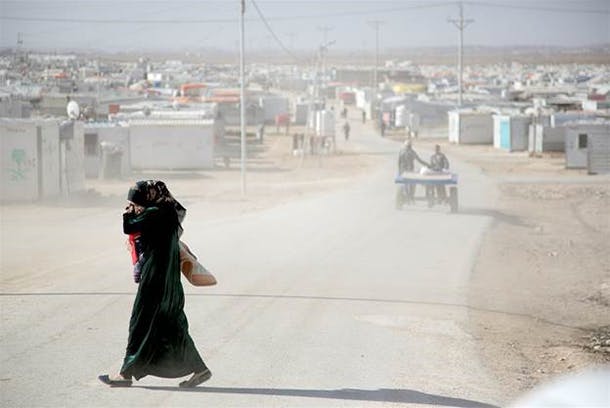
In August, I joined the United Nations Foundation’s Global Entrepreneurs Council, a group of leading entrepreneurs committed to finding innovative solutions to global problems, on a trip to Sweden and Jordan to learn how these countries are addressing the rising number of refugees coming into their borders and how private sector leaders can support refugees.
Right now, more than 65 million people around the world have been forcibly displaced – the highest number ever recorded. The United Nations has called on the international community – including the private sector – to step up collective efforts to people forced from their homes by conflict and violence.
Here are five lessons I learned during the trip to take into account as we work to strengthen the global response to the refugee crisis.
Entrepreneurship thrives everywhere.
People often focus on refugee statistics, but behind the numbers are the stories of innovators and entrepreneurs. For example, the Zaatari refugee camp in Jordan is home to some 3,000 businesses. From selling furniture to baking bread, refugees in the camp are leveraging entrepreneurship to help provide for their families. As UN Secretary-General Ban Ki-moon has written, “These are brave, resilient, and forward-looking people who bring needed skills and energy to their new societies.”
Additionally, innovative solutions are helping to open opportunities for refugees. For example, mobile apps and mentorship programs in Sweden are connecting refugees in the country to professional and social networks to help them find jobs. And technologies like iris scans and debit cards are making it easier for UN agencies to quickly get resources to families in need.
By leveraging innovation and the entrepreneurship of refugees, we can help more families get ahead.
We need to meet both the short-term and long-term needs of refugees.
For families forced to flee their homes, immediate humanitarian aid such as food, shelter, and health care is essential, and the international community must do more to make sure that this lifesaving aid reaches everyone in need.
At the same time, a growing number of crises continue for many years, preventing millions of people from safely returning home and resuming their lives. In addition to immediate aid, we heard time and time again that refugees want longer-term economic opportunities to provide for their families and contribute to their communities. This applies to refugees, whether they are living in camps or have been resettled. For example, in Sweden, we were told that it can take refugees 5-10 years to establish themselves in the labor market.
We must work better between the humanitarian and development communities to meet the range of refugee needs. Earlier this year, Jordan announced measures to make it easier for more Syrians to find work in Jordan as part of a compact between the country and the international community to spur international investment and economic development.
Many refugees live outside camps, and they need more support.
People often think of camps when they think about where refugees live, but in Jordan, over 80% of refugees live outside of camps as urban refugees. The head of the Zaatari refugee camp emphasized that camps should be a last resort; living in communities provides more dignity and is less expensive for UNHCR to assist.
Yet, urban refugees can be harder to reach with social services, and urban assistance programs receive less funding from donors. Many of these refugees are struggling as they run out of savings and have few opportunities to make money. A report in December found that 9 out of 10 registered refugees in Jordan are living in poverty or soon will be.
We met single mothers living in apartments in Amman, struggling to take care of their children. Their needs are often visible to the world, but we can’t ignore them.
Countries hosting refugees need support.
Jordan is now hosting more than 655,000 registered refugees, and its health care, education, water and sanitation, and other systems are feeling a strain as funding resources have not kept up with growing needs. A World Bank report estimated that the influx of refugees has cost Jordan more than $2.5 billion a year. Jordan has developed a response plan to strengthen its economy and address the needs of Syrians and Jordanians, but consistent support from the international community is needed.
To help support Jordanians living in poverty, the UN Development Programme has launched an emergency employment program that helps men and women develop skills and provides mentorship and seed funding to launch business ideas.
We share a common humanity.
Refugees are people, just like any of us, and we are united by a shared humanity. Throughout the trip we met mothers, fathers, and children; entrepreneurs and innovators; business owners and government officials. The common thread throughout our meetings was that people wanted to build a better future for the next generation.
To reach that better future, we must remember that we are united by so much more than what divides us and that no one should be left behind in a world filled with so much knowledge and so many resources.
TAKE ACTION: You can help refugees by supporting the work of the UN Refugee Agency. Donate here, and sign the petition to stand #WithRefugees.
[Photo: Patrick Adams]



 View All Blog Posts
View All Blog Posts